LGBTQ Iowans say state is worse off than 15 years ago, when same-sex marriage legalized
Bee Criswell was three months into a new relationship when they hurried through the doors of a Davenport church and grabbed some seats.
Neither Criswell nor their date was religious, but they wanted to celebrate with close friends and other familiar faces who packed the Unitarian Universalist Congregation of the Quad Cities that night on April 3, 2009.
The Iowa Supreme Court had just ruled same-sex marriage legal in the case of Varnum v. Brien, and the decision was unanimous. It was a historic victory for the state's gay and lesbian couples and a sign of hope for others across the nation who had long waited for the day their union would be recognized in the eyes of the law.
The case catapulted Iowa into the national spotlight as it became the third state — and the first in the Midwest — to establish marriage equality.
All eyes were on the heartland.
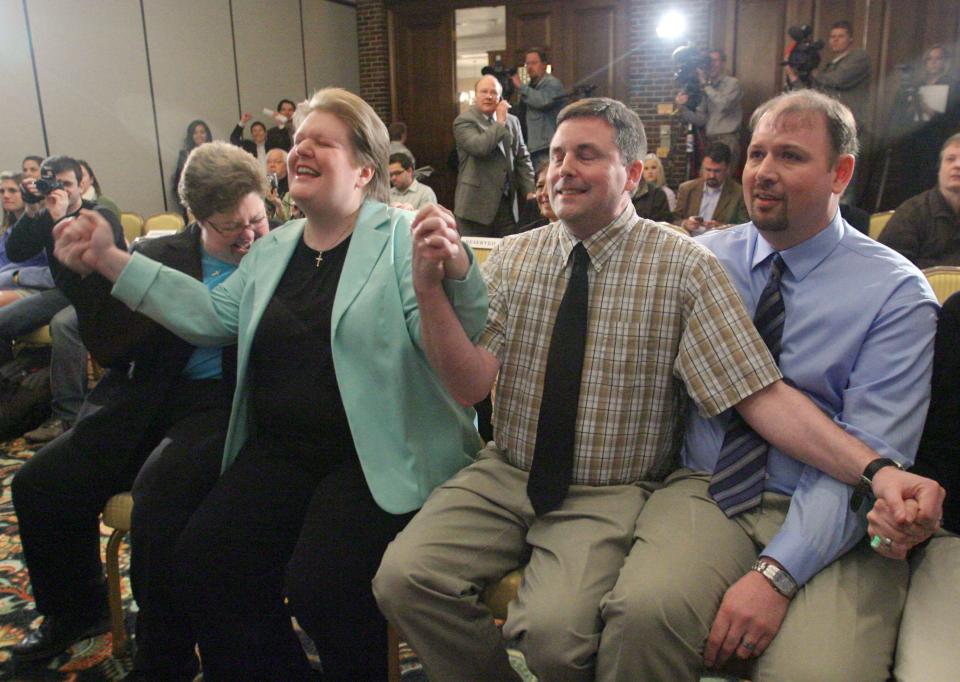
"We felt like we were a part of history," recalled Criswell, who is nonbinary and uses they/them pronouns.
Criswell was then 18, their girlfriend was 20. They met on Facebook through a mutual friend "because it was 2009," Criswell laughed, "and that's what you did." Young and in love, the two weren't sure what the future held for them — only that they would tie the knot someday.
But memories of that joyous event are clouded by a cold reality.
Criswell is among many Iowans who say it is hard to celebrate the 15th anniversary of the landmark case as anti-LGBTQ bills sweep through the Iowa Legislature. Even the lead plaintiffs of the case — Trish Varnum and her wife, Kate Varnum — say they have considered leaving the state if they no longer feel safe here.
More: Iowa LGBTQ families ask if they still belong after new laws restrict their rights
LGBTQ Iowans who spoke to the Des Moines Register say they are horrified at state lawmakers who have introduced legislation targeting families and youth and threatening their access to health care, instruction and books in schools or even their use of preferred pronouns.
And they say the fight for marriage equality was one battle in a longstanding war for LGBTQ rights — and it's clear from the work of the Iowa Legislature over the past few years their fight is far from over.
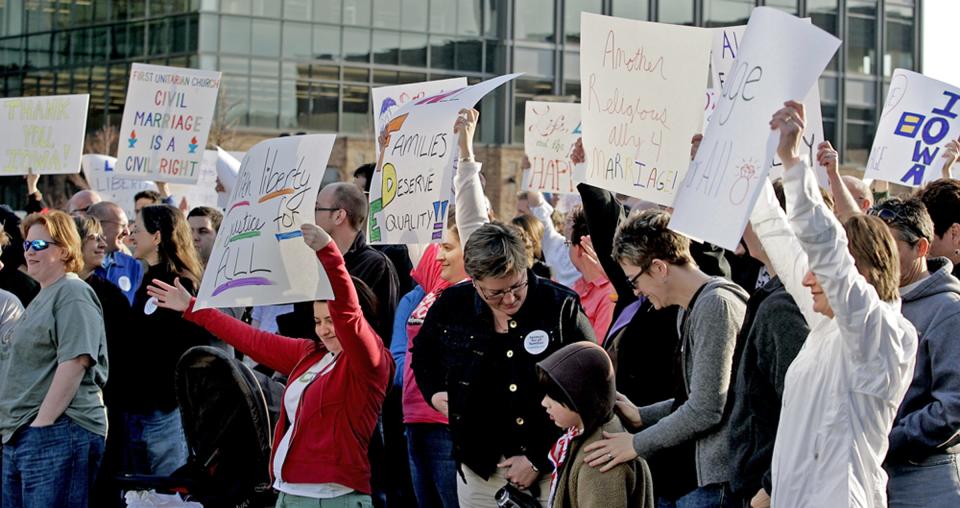
"This is not the Iowa of 15 years ago at all, and the joy that we had 15 years ago feels absolutely hollow now," Kate Varnum said. "It's hard to celebrate this victory, this anniversary because we know how things are now and how much further we have to go to achieve equality.
"We just want our brothers and sisters to be treated fairly. We're not looking for anything special."
LGBTQ Iowans talk challenges, policies that impact them
Bee Criswell, now 33, smiled often as they spoke about that event at the Unitarian church. They married their then-girlfriend, Kathy Criswell, not immediately after the court ruling, as they had joked, but three years later.
They were wed in June 2012 in front of friends and family. Their siblings made up the bridal party, and their parents walked them down the aisle.
The couple wore red dresses to match their pin-up-themed party and topped off their look with curly hairdos — a stark contrast to the shorter, shaggier cut Bee Criswell sports now.
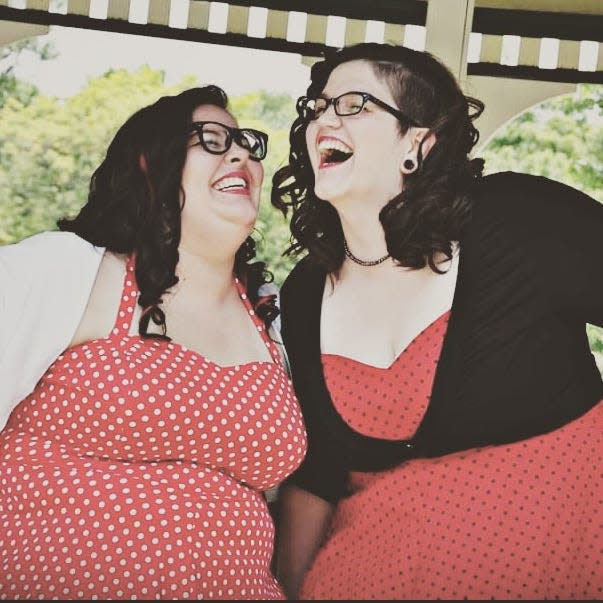
But they said it's hard to look at photos from that day. Most of their queer and trans friends who gathered are now gone. Some have died by suicide. Others have succumbed to addiction.
"It's just statistically we knew that not all of us would make it, and it's only by chance that we do," Bree Criswell said.
Researchers say LGBTQ adults and youth are at a higher risk for suicide-related behavior and substance abuse than cisgender people.
A 2021 study from the National Institute of Mental Health found that suicide risk among lesbian, gay and bisexual adults was three to six times greater than among cisgender adults surveyed across every age group and race and ethnicity category.
A more recent report by the UCLA School of Law showed transgender adults were seven times more likely to contemplate suicide than cisgender adults. Transgender adults struggling with substance use were "significantly more likely to experience poor mental health during their lifetimes" compared with cisgender people, UCLA researchers found.
Survey results from the Trevor Project found that 41% of LGBTQ people between 13 to 24 had "seriously considered" attempting suicide in 2023. Those rates were reportedly higher for young people who are transgender, nonbinary or people of color.
Fifty-six percent of LGBTQ young people also said they were not able to get the mental health care they needed in 2023.
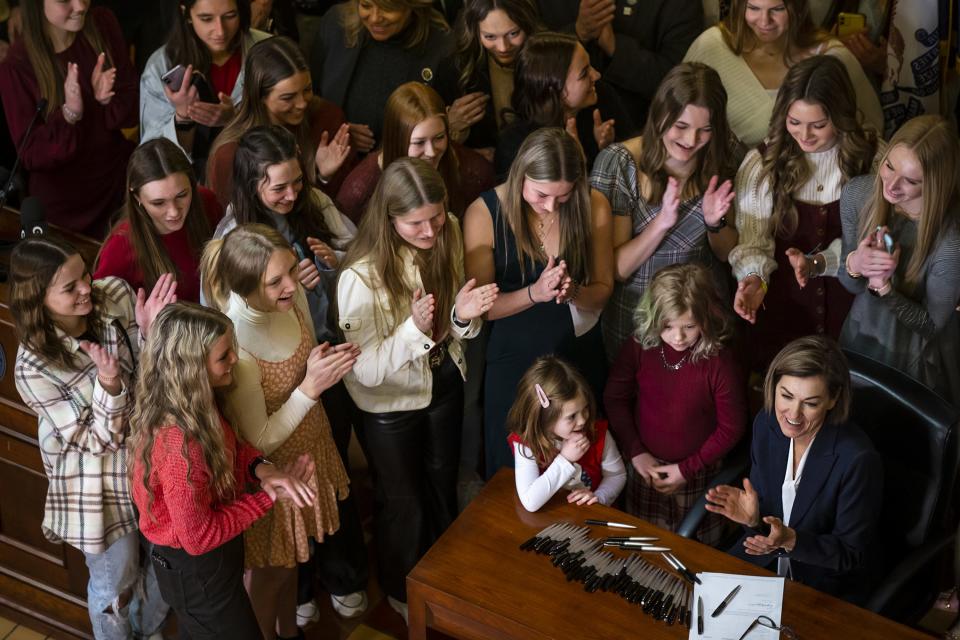
In the last few years, Gov. Kim Reynolds has signed laws that prohibit transgender girls from competing in girls sports, ban transgender children from accessing gender-affirming care and forbid transgender students from using school restrooms or changing rooms that do not align with their sex at birth.
Reynolds told reporters when she signed the bill last year that the ban on gender-affirming care for children was "heartbreaking" but necessary, arguing that "the science is not there to support it." She argued it is in the best interest of children.
"I don’t think it was unreasonable — and I think the majority of Iowans agree with that — to just pause and wait until we get some more data to make sure that we’re not using these children as an experiment," Reynolds said. "Because these are irreversible therapies and surgeries that have long-term effects."
She also signed a law last year that requires schools to remove books that contain sex acts and prohibits teaching on gender identity or sexual orientation for students in kindergarten through sixth grade.
Enforcement of those provisions are on hold while families with LGBTQ children and a book publisher sue the state. The law also requires parents to be notified if their child comes out as transgender at school or requests to use different pronouns or a different name.
And, during this legislative session, Reynolds proposed a bill that would have required transgender Iowans' birth certificates to include their sex at birth and their current gender identity, as well as redefined "man" and "woman" in state law so transgender women could be excluded from women's facilities like state prisons and domestic violence shelters.
Opponents branded the legislation "LGBTQ erasure." The measure died without receiving a vote.
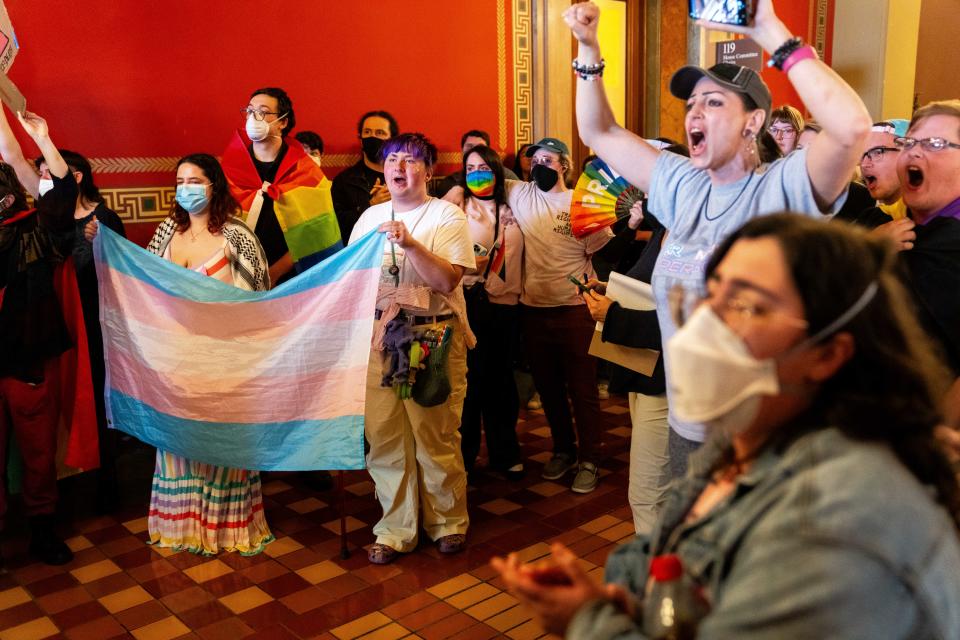
Reynolds is poised to sign into law a "religious freedom restoration act" that supporters say will allow Iowans to go to court if the government burdens their right to practice their religion. Opponents say the legislation will allow Iowans and businesses to use religious beliefs to justify discrimination against LGBTQ Iowans and others.
Reynolds could not be reached for comment for this story. State Rep. Steve Holt, who was among the 61 Republican lawmakers who voted in favor of the act, said in an email that he found it "interesting and disappointing that some want to group all the issues related to LGBTQ into one category, when in reality, there are very different issues involved."
Holt, who represents Iowa House District 12, said in an email he has come across several bills relating to the LGBTQ community and given each one the attention, "the consideration and respect it deserves. I have repeatedly not advanced legislation if I believe it legislates hate or discrimination."
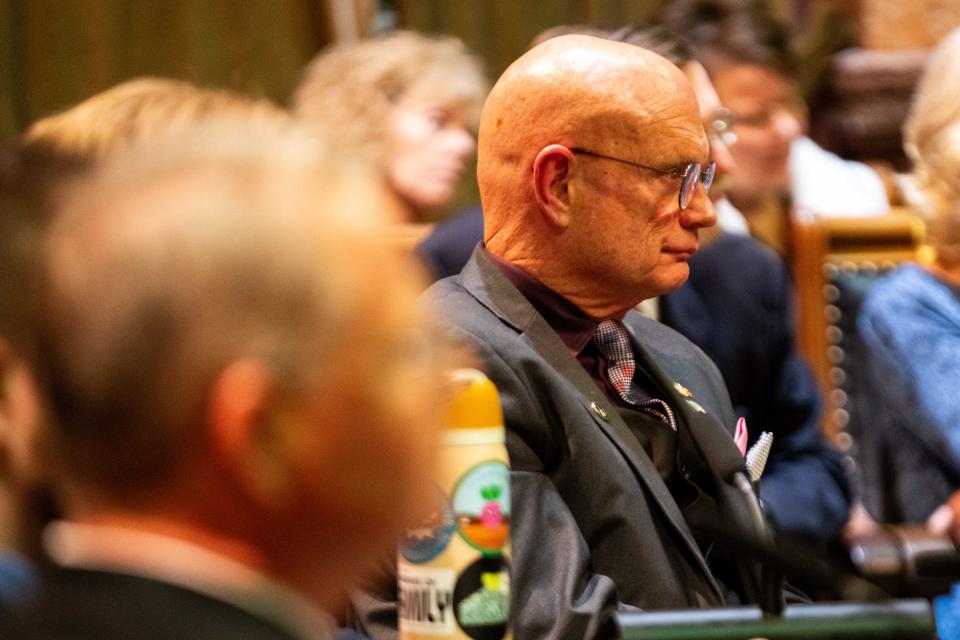
In 2020, Holt used his position as Judiciary Committee chair to kill a bill that sought to remove protections against discrimination for transgender people. Holt, however, scheduled a subcommittee hearing earlier this year when a similar bill resurfaced, saying it was time to open the conversation. Though he expressed concerns, he said at the time he wanted to "at least" have a discussion and "see where it goes."
"Regarding gender identity, I do not think we can shy away from these difficult conversations any longer," Holt said. "The House has taken action only on the bills we think are important to protecting women's rights and the safety of children. As always, I will continue to listen to all Iowans as I carefully consider any piece of legislation and its impact on Iowans."
For Shekendra Morgan, the impact is clear.
"It's horrible, to say the least, not allowing our youth to be their true authentic self," said Morgan, a 27-year-old from Des Moines.
Morgan, who is nonbinary and uses he/they pronouns, moved to Iowa from a small town in South Dakota a few years ago and immersed himself in the city's arts and entertainment scene. He is worried for Iowa's LGBTQ youth who are repeatedly up against legislative bills that could greatly impact their formative years and their futures.
While Iowa's political landscape may seem in turmoil, Morgan said he is hopeful. Young Iowans are "speaking up" for themselves and "showing out," he said.
There also are people in Iowa who continue to advocate for them and their families and carve out safe, inclusive spaces. That includes leaders from churches, organizations and community groups who prioritize LGBTQ youth and adults, Morgan and Criswell said.
More: Here's how to celebrate Transgender Day of Visibility today in Des Moines
The Criswells in the past have opened their home to people seeking refuge. That "Iowa Nice" attitude lives on through neighbors who believe in helping one another.
"I joke all the time that trans and queer people — we're all just passing the same $20 on Venmo to each other," Criswell said.
"We as a community are proving to each other almost every day with the mutual aid acts that we are committed to and the services we're giving to each other," Morgan said. "And it's proving to me that we've been here and we will continue to be here. It makes me happy to know that we're taking care of each other in a way that I didn't know was possible before."
'You can't legislate me out of existence,' says one Iowan
Still, the future of Iowa for LGBTQ residents remains uncertain, and many couples who spoke to the Register say they have considered moving elsewhere. For some, it's not a matter of if, but when.
The Criswells are planning to move to Illinois. Though they felt safe living in the Quad Cities, they said it is Iowa's politics that have chased them out.
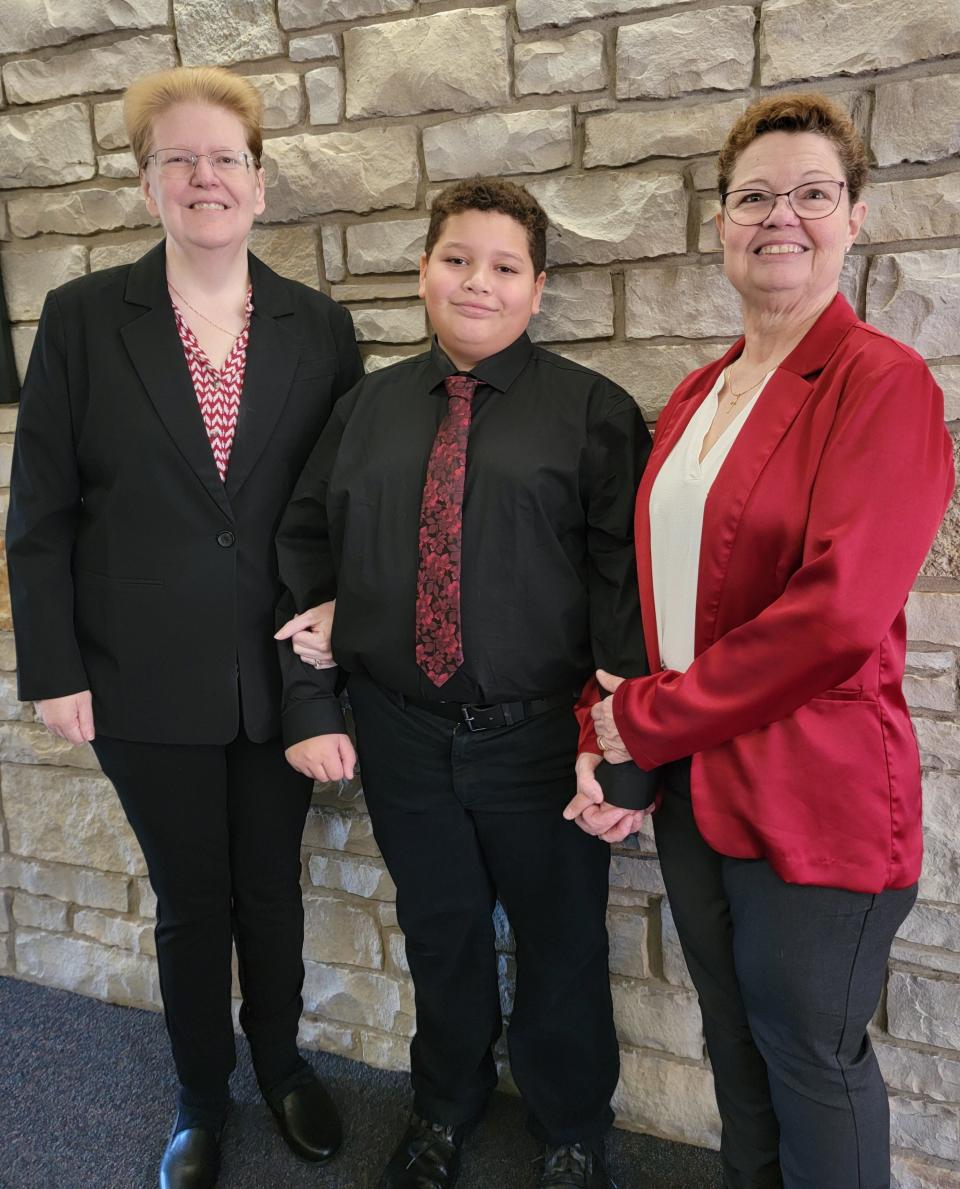
The Varnums — the lead plaintiffs of the 2009 landmark case — also are among the couples who have had those difficult conversations. The pair from Cedar Rapids said they have watched close friends leave for similar reasons.
"I don't want to live in a state where I am not legally welcome," said Kate Varnum, 50. "That's hard because Iowa is my home. It's been my family's home for generations. I don't want to leave, but if it's for the safety of my family, we will leave."
Last March, state lawmakers introduced a ban on same-sex marriage — a move the Varnums said they could never have predicted.
"This is not the Iowa where we won the case," Trish Varnum, 59, said.
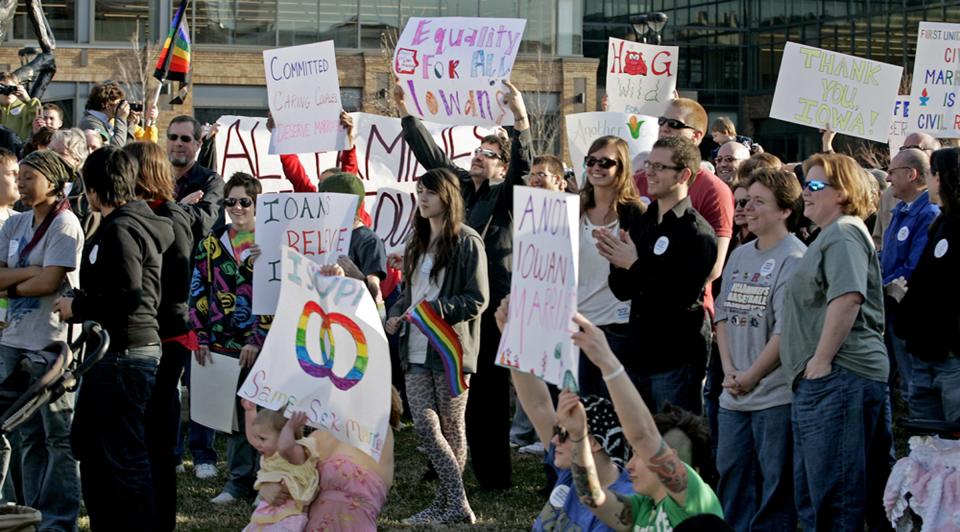
More: Hulu documentary follows Iowa natives who fled state after LGBTQ+ legislation
The two said the landmark case was a sign of progress — a defining moment in a constant struggle for equality.
To them and several others, marriage equality was about granting gay and lesbian people marital rights as heterosexual couples. Under the court ruling, Bee Criswell said they felt free to call Kathy Criswell their wife.
The Varnums said they could legally care for each other and their son, who they adopted a few years later. They also could file their taxes as a married couple.
"We wanted and needed the legal protections that it provides," said Dawn BarbouRoske, who joined the Varnums in the lawsuit in 2009 to overturn the state's outright ban on gay marriage.
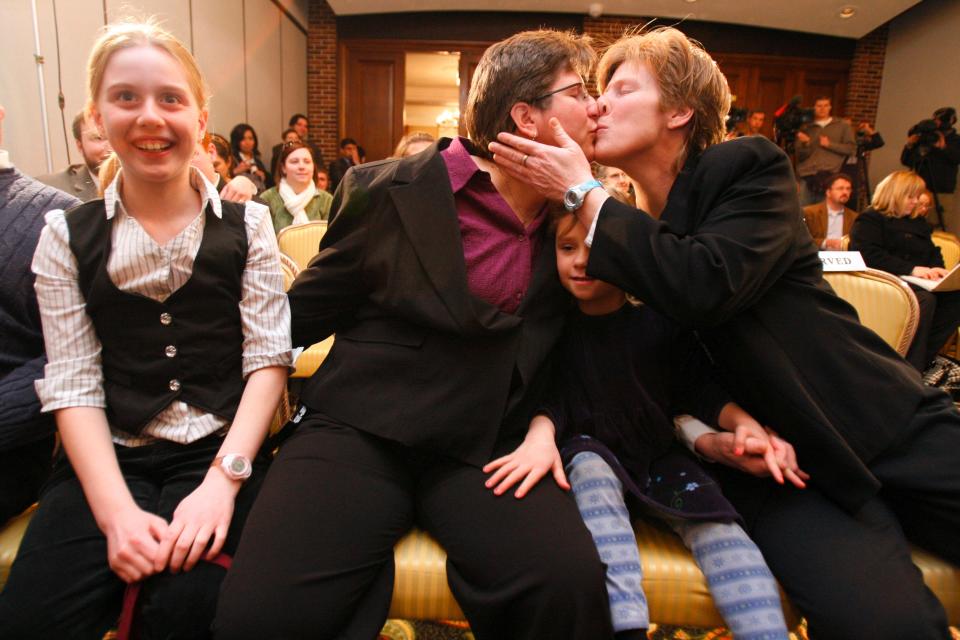
Max Mowitz, program director at One Iowa, a nonprofit focused on LGBTQ rights, said the Varnum v. Brien case is not the "pinnacle" of equal rights for LGBTQ Iowans but a move in the right direction. There are many Iowans from marginalized groups fighting for their rights, said Mowitz, who is nonbinary and uses he/they pronouns.
Mowitz, 31, of Des Moines, said he dreams of an Iowa that is "tied up in solidarity and liberation" for all people, not just those who are LGBTQ. With plans to stay in Iowa, he said he will continue that fight and lift people up.
Like Criswell and Morgan, the Varnums and Mowitz spoke about the people they have met who have helped them through. They said they encourage others to get involved and share their experiences with anyone willing to listen.
Start small, the Varnums said. Start with the people closest to you, they advised. LGBTQ people have always existed, and "we'll always be here," Criswell said.
"You can't legislate me out of existence. I still exist," they continued. "Kim Reynolds: I'm still here."
F. Amanda Tugade covers social justice issues for the Des Moines Register. Email her at [email protected] or follow her on Twitter@writefelissa.
This article originally appeared on Des Moines Register: LGBTQ Iowans struggle to celebrate 15-year gay marriage anniversary
